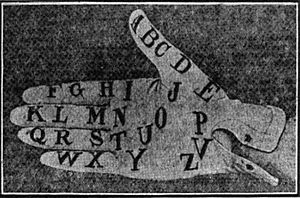Morrison Heady facts for kids
James Morrison Heady (July 19, 1829 – December 19, 1915) was an American author who was deafblind. This means he could not see or hear. People often called him the "Blind Bard of Kentucky." Heady wrote many books for children and also poetry. He was one of the first people to speak up for making books available for blind people in the United States. He also invented several helpful tools to make it easier for deaf and blind people to communicate and live better lives.
Contents
Early Life and Learning
James Morrison Heady was born on July 19, 1829, in a place called Elk Creek, Kentucky. When he was very young, he lost sight in one eye because of a woodcutter's axe. Then, at age sixteen, he lost sight in his other eye while playing with a friend at school. His hearing was also damaged when he fell from a horse as a child. His hearing got worse over time until he was completely deaf by the age of forty.
After losing his sight at sixteen, Heady went to the Kentucky School for the Blind for one year. Then he attended the Ohio State School for the Blind for another fourteen months. There, he learned to read special books with raised letters. He also invented a "talking glove." This was a cotton glove with letters of the alphabet printed on different parts of the hand. He used this glove to spell out words by touch and talk with his friends. He taught himself a lot by reading books. He even collected one of the largest private collections of raised-type books in the United States.
Writing and Helping Others
James Heady became friends with other famous deafblind people, like Helen Keller and Laura Bridgman. He also made friends with important people who would read to him. These included the poet John Greenleaf Whittier and the doctor Simon Flexner. Heady kept up with the news by reading magazines like Matilda Ziegler Magazine for the Blind in raised print.
When he was in his 20s, Heady traveled all over the United States. He encouraged people to make more books available for blind people. In 1854, he started collecting money to publish a famous poem called Paradise Lost in raised print. Heady's efforts inspired another blind man, Dempsey Sherrod, to raise money for a national printing house for blind people. This led to the creation of the American Printing House for the Blind. In 1860, Heady was asked by this printing house to help collect donations for publishing more raised-type books.
Heady's writing career began when he would tell stories about pioneer times to local schoolchildren. His friends encouraged him to write these stories down. His first book was a children's biography about George Washington. It was called The Farmer Boy, and How He Became Commander-in-Chief. Heady wrote it in 1864 using the pen name Uncle Juvinell. This book sold more than 8,000 copies! One of his most important works was a book of poems called The Double Night and Other Poems. This book shared his own feelings about loss. He wrote many different kinds of books, including children's stories, love poems, and thoughtful poems.
Heady's Inventions
Heady created several inventions during his life. Many of them were designed to make things easier for deaf or blind people. Some of his inventions included a gate that opened by itself, a chair that could spin around, and a special container to keep coffee warm. In the 1860s, he built a machine that used water power to lift water from wells. Heady also made a working model of a steam-powered press for printing raised letters.
Another one of his clever inventions was called the "diplograph." This was a typewriter that could switch between three different raised writing styles used by blind people: Boston line letter, New York Point, or braille.
In 1901, Heady moved from Spencer County to Louisville. He finished his last two books when he was 86 years old, not long before he passed away on December 19, 1915.
Legacy and Recognition
A book about Heady's life, called Beyond the Double Night, was written by Ken D. Thompson and published in 1996.
In 2004, the Kentucky Historical Society put up a historical marker in Heady's hometown of Elk Creek. This marker tells about his life and achievements. It says:
The Blind Bard of Kentucky was blind by fifteen and deaf before forty. Neither condition limited his contributions. As friends read aloud, he embossed notes on the Diplograph machine he invented and built. He invented the Talking Glove with the alphabet printed on it so others could communicate by touching the letters. Heady's other inventions included the pull-chain home farm gate, furniture, utensils, and games. Built a steam-powered embossing press for American Printing House for the Blind, and wrote and published prose, poetry, and songs. Entombed with his parents in the Elk Creek Cemetery.
Images for kids
 | Janet Taylor Pickett |
 | Synthia Saint James |
 | Howardena Pindell |
 | Faith Ringgold |



